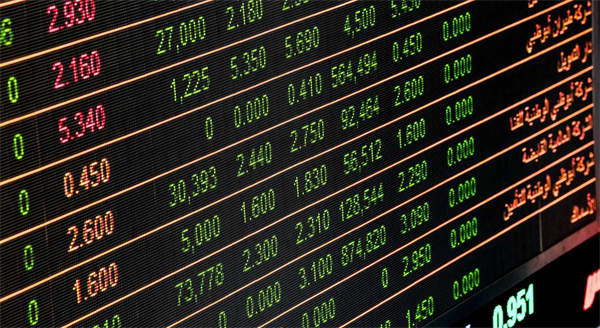
Since December, many central banks around the world have chosen to suspend the pace of interest rate hikes, and the market focus has further shifted to the point of interest rate cuts. Some analysts say that at present, the Federal Reserve has released a certain signal of interest rate cuts, while the European Central Bank and the Bank of England are more cautious, and the Bank of Korea may cut interest rates later under the pressure of weakening economic growth.
The Fed's December monetary policy meeting left the target range for the federal funds rate unchanged between 5.25% and 5.5%. It is the third time in a row that the Fed has left that range unchanged since September.
The European Central Bank decided on the 14th to keep the main refinancing rate, marginal lending rate and deposit mechanism rate at 4.50%, 4.75% and 4.00% respectively, but will accelerate the reduction of balance sheet. The European Central Bank put interest rates on hold in October as inflation fell markedly.
The Bank of England (BOE) kept its key interest rate unchanged at 5.25% on the 14th. The Bank of England also left rates unchanged at its September and November meetings, ending a string of 14 hikes.
The Bank of Canada (central bank) also left its benchmark interest rate unchanged at its current level of 5% for the third month in a row at its December monetary-policy meeting.

The Reserve Bank of Australia (the central bank) announced in December that it would maintain the benchmark interest rate at 4.35 percent, while maintaining the rate on foreign exchange settlement balances at 4.25 percent.
The Bank of Korea also decided to keep its benchmark interest rate unchanged at 3.5% in late November, Yonhap news agency reported. This is the seventh time this year that the Bank of Korea has decided to leave the benchmark interest rate unchanged.
At the monetary policy meeting held on the 19th, the Bank of Japan announced that it would continue to maintain its ultra-loose monetary policy, maintaining the target ceiling of long-term interest rate control at 1% and short-term interest rate at negative 0.1%.
This year, global inflation has generally moderated, providing support for central banks to stop raising interest rates. U.S. inflation fell to 3.1% in November from 9.1% in June 2022; The Congressional Budget Office predicts that inflation will fall back to 2.1 per cent by the end of 2024, close to the Federal Reserve's 2 per cent target. Eurozone inflation has fallen from 10.6% in October 2022 to 2.4% today. The AP reports that global inflation is expected to average 6.9 percent this year, down from 8.7 percent last year.
The Federal Reserve has recently signalled some interest rate cuts. Federal Reserve Chairman Jerome Powell said after the December monetary policy meeting that the current federal funds rate may be close to the peak of this tightening cycle, and further hikes are unlikely, but they are not ruled out. If the economy develops as expected, the appropriate level of interest rates is expected to be 4.6% by the end of 2024. Wall Street traders are now pricing in more than an 80% chance that the Fed will cut rates in March and possibly six times over the course of next year.
However, the European Central Bank and the Bank of England remain cautious about cutting interest rates.
The European Central Bank has not yet delivered a clear signal to cut interest rates. Analysts believe the ECB has become more confident that inflation will return to its 2 per cent target over the medium term, but remains concerned that rising Labour costs are fuelling upward pressure on inflation. The timing of eurozone rate cuts may lag market expectations.
ECB President Christine Lagarde said a rate cut was not on the table at the December meeting and that "now is not the time to let down our guard," suggesting that eurozone interest rates could be cut only when upward wage pressures ease.
Carsten Brzeski, head of macro research at ING, believes that the ECB's latest decision "confirms the end of the rate hike cycle," but that the rate cut cycle will start later than the market expects.
UK inflation fell to 3.9 per cent in November, better than expected but still significantly above the central bank's target. The Bank of England signalled after its latest rate-setting meeting that it would keep interest rates high to combat inflation and was unlikely to cut them in the near future.

Markets now expect the Bank of England to cut interest rates by 0.25 percentage points in May next year. Samuel Toomes, chief UK economist at Pantheon Macroeconomics, said the unexpected fall in inflation meant the Bank of England was more likely to cut interest rates in the first half of 2024, much earlier than it is currently signalling.
The Bank of Korea is expected to struggle to cut rates ahead of the Fed. The Bank of Korea has suspended interest rate hikes seven times because the financial imbalance continues to grow amid sluggish economic growth and rising household debt. But household debt has continued to grow rapidly since April, and the interest rate spread with the US has widened to an all-time high, making a stronger dollar and foreign capital outflows more likely than ever.
The drag on economic activity from interest rate hikes by central banks around the world to curb inflation continues to be felt.
In the US, high interest rates have hit the housing market hard. As the Federal Reserve has raised interest rates, the 30-year fixed-rate mortgage rate has risen from 4.16% in March 2022 to 7.79% in October. Sales of previously owned homes in the US fell 20 per cent in the first 10 months of the year. While home sales have fallen sharply, prices are still rising, making buying a home more unaffordable for many people.
Europe's economy is struggling with high interest rates. According to the latest forecast released by the European Central Bank on the 14th, the European Central Bank has lowered its economic growth forecast for the eurozone in 2023 to 0.6%, and adjusted the growth forecast for 2024 and 2025 to 0.8% and 1.5% respectively.
Germany, the eurozone's largest economy, contracted 0.1 per cent in the third quarter compared with the previous quarter. The Bundesbank expects the economy to contract again in the fourth quarter. Germany's central bank recently slashed its growth forecast for next year from 1.2 per cent to 0.4 per cent.
The Bank of Canada says Canada's economic growth stalled in mid-2023, with gross domestic product falling by 1.1 per cent in the third quarter. Higher interest rates have dampened spending, consumption growth has been close to zero for the past two quarters, and the economy is no longer in excess of demand.
In the coming 2024, the United States is likely to complete the turning point of the cycle from interest rate hike to interest rate cut. After the Federal Reserve sounded the "interest rate cut", more central banks will join in the future, and it is only a matter of time for the global "interest rate cut tide". 2024 is destined to be an extraordinary year, and any rate meeting could "Shake up global markets"!

Recently, according to Al Jazeera, Israel has recently carried out a new round of air strikes on the Gaza Strip, killing about 100 Palestinians, including women and children.
Recently, according to Al Jazeera, Israel has recently carr…
On November 3rd local time, the Foreign Minister of Peru, U…
Recently, TSMC, the leading wafer foundry, stated that it w…
Amazon recently filed a complaint with the Oregon regulator…
In October 2025, the US credit market witnessed a surge of …
When the London gold spot price fell from a high of $4038.9…